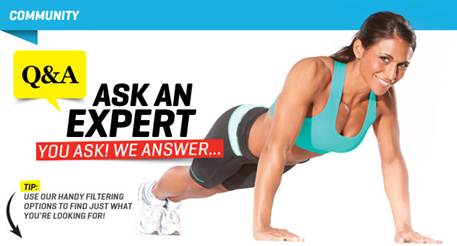
GP and
Embarrassing Bodies doctor: Pixie McKenna
Trainer and
fitness consultant: Jane Wake
Contributing
beauty editor: Leyla Tabaksert
Zest staffer and
nutritionist: Lyndsey Heffernan
Feeling faint
Q: In the last
month, I’ve fainted in the shower three times. I’m eating properly and don’t
have any other symptoms – what’s wrong?
Kim, 33, Edinburgh
A: It sounds
like vasovagal syncope – a temporary malfunction in the system that controls
your blood pressure and circulation. When something over-stimulates the vagus
nerve, your blood pressure and heartbeat drop, so you fall to the floor, which
allows your blood pressure and pulse to rise again. It can happen after long
periods of standing still or in a warm environment – hence the shower. See your
doctor to rule out problems with blood pressure, blood sugar or iron levels.
Mention any family history of heart disease or diabetes, any recent head injury
of lifestyle changes and be honest about drug and alcohol use.
Pixie
Sleep-inducing eats
A: I suffer from
insomnia and try not to eat anything or drink coffee after 7pm, but I’m sill
struggling to get my zzzs. What can I eat for a better night’s sleep?
Hannah, 31, London
Being too hungry
can disturb your sleep, so have a snack an hour or so before hitting the sack.
The hormone melatonin is what makes us feel sleepy, but your brain needs
tryptophan, found in poultry, beef, eggs, fish and nuts, to produce it.
subsequently, tryptophan needs carbohydrate to transport it into your brain, so
a turkey sandwich makes a good sleep-inducing supper. Calcium also helps
tryptophan enter the brain. Which is why hot milk, with its mix of tryptophan,
carbohydrate and calcium, is such a popular bedtime drink. Also, caffeine can
keep you buzzing for hours after you consume it, so ditch it after midday.
Lyndsey
Banish bags
Q: Why do I
always wake up with puffy, baggy eyes?
Erin, 35, Suffolk
A: Fluid
build-up around the eyes looks so much worse first thing simply because your
body is pulled down by gravity as you stand, causing any resting fluids to
droop with it. it should be less noticeable within the hour but there are
things you can do to help. First, cut down on salt – it’s a major cause of
fluid retention. Second, hold a cold damp flannel over the area for minute each
morning or dab on an eye gel, such as The Body Shop Elderflower Cooling Eye
Gel, £6.50. Third, elevate your pillow a touch to reduce the rush of fluids to
the eye area overnight. A little more sleep won’t hurt either.
Leyla
Lump concern
Q: I found a
lump in my breast two years ago. After screening, my doctor confirmed it wasn’t
cancer but it’s still there and it’s painful, too. Should I go back?
Sara, 34, by
email
A: Yes, yes,
yes! For reassurance, if nothing else. Most breast lumps in women of your age
aren’t cancerous but even benign lumps should be reassessed regularly and you
can be re-scanned to compare the size of the lump with two years ago.
Unnecessary surgery can cause pain and scarring so don’t be surprised, assuming
all’s well, if you’re still advised against removing it.
Pixie
Probiotic confusion
Q: Lots of foods
are labeled as containing probiotics while some have prebiotics. What’s the
difference?
Sally-Ann,
29, Glasgow
A: Probiotics
are the “good” bacteria in your gut, which help maintain a healthy digestive
system, while prebiotics are nutrient in certain foods (such as bananas,
apples, garlic, spinach, onions and wholegrains) that “feed” the good bacteria.
Stress, a poor diet and some medications can cause an overgrowth of “bad”
bacteria, so it’s important you have a full army of the good guys to prevent
the bad ones taking over. Some foods, like bread and cereal, one fortified with
prebiotics but they can be expensive. However, by following a healthy diet low
in sugar (which the baddies thrive on) and high in fruit and veg, along with a
regular dose of inexpensive, probiotic-packed live yogurt, you’ll get a good
balance without spending a fortune.